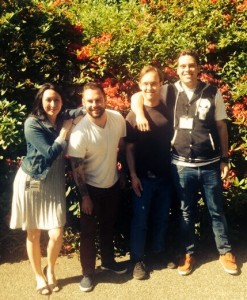Some of the Spark Lab professors and students hit the road this last week to gather with (600!) other Digital Humanists at the Digital Humanities Summer Institute at the University of Victoria.
Karis Shearer, Cole Mash, and Justin Kroeker were all enrolled in “The Sound of The Digital Humanities,” alongside Lee Hannigan, a former FCCS student who now works as a graduate RA on the Spoken Web project at the University of Concordia. The course, on best practices for sound archiving and curation, complements the work of the POSA archive that Dr. Shearer leads in the lab.
Our Chair, Jennifer Gustar, took the new “DH for Department Chairs and Deans” course offered by DHSI director, Ray Siemens. Meant to answer the question “Just what are the Digital Humanities?” (a question, I must say, I often get), the course allowed chairs and deans to visit the other 27 classes at the DHSI to see Digital Humanities in action.
I was happy to jet off to the DHSI too. I team-teach one of the Text-Encoding Fundamentals courses at the DHSI, and am always glad to get together with other encoders, no matter what their level (to anyone who has taken or who is thinking of taking DIHU 301: The Self-Conscious Text, check out Martin Holmes’ CodeSharing service which lets you have a look at the TEI-XML that drives the Map of Early Modern London project).
In amongst the courses, colloquia, unconference sessions, and plenary talks, there were plenty of happy reunions. EMiC, whose textual editing summer institute Karis Shearer hosts right here at UBCO, holds its digital editing institute at DHSI. The Canadian Research Writing Collaboratory which hosts some of the Lesbian and Gay Liberation in Canada data, ran a course on the importance of interoperability and digital sustainability for Canadian cultural heritage. Dene Grigar, a researcher with the Digital Botanical Garden project, ran a course on e-lit and curated an engaging e-lit exhibit.
Whether it’s to share our research, connect with new collaborators, or learn more about topic modelling, desktop fabrication, or linked open data, I think we are all already planning our trip back to Victoria next year.

